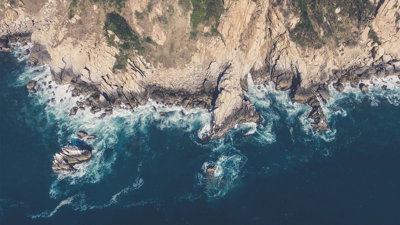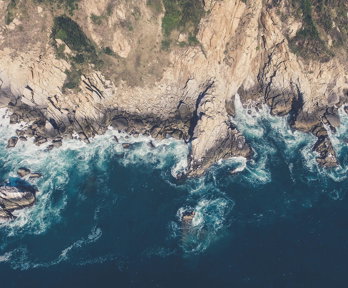The aim of this module is to explore coasts as dynamic and changing systems. It will examine different types of coasts both in terms of their landforms and their uses and provide a framework within which students can explore different coastal features and processes. The module concludes with an opportunity for students to apply their knowledge and understanding of coats to plan a day’s fieldwork. By the end of the module students should understand the importance of different coastal zones and how they are affected by, and can affect, human activity.
More than just a day at the seaside
The module begins with identifying what a coast is and what different coasts look like. From here students use atlases to locate different coastal features around the world and start to consider how these features may change over time.
Coastal features and processes: the what and how of coasts
The module goes on to extend students’ knowledge of these features by exploring how they were formed by different coastal processes.
"London-on-Sea"
Once they have considered how different coasts are used for different purposes, and how coasts can benefit and/or disadvantage people living there, students apply their knowledge to consider what London would be like if it was located on the coast. Students have the opportunity to explore how London might benefit from being a coastal city, as well as considering what problems it might face.
People vs Coast
Lesson four focuses on human activity in coastal areas; the impact this activity has and the challenges people living in coastal areas face. Two case studies are used to explore these ideas. The first, longshore drift in Ghana, examines how construction of the Akosombo Dam on the River Volta has reduced sediment levels in the Volta Delta, which has led to coastal erosion through the process of longshore drift. The second case study, land reclamation in the United Arab Emirates, examines how and why land reclamation has changed the coastlines of Abu Dhabi and Dubai and the problems these two Emirates are facing.
Planning coastal fieldwork
Finally, the module highlights the importance of fieldwork by asking students to plan a day’s fieldwork to investigate evidence of longshore drift on a nearby coast. Students can use any knowledge they have developed over the course of the module and apply it to their chosen fieldwork site before suggesting what the finding might show.
While it is impossible to cover all aspects of coasts in such a small number of lessons, it is hoped that this module gives students exposure to some of the main features of the topic and provides them with an opportunity to apply their coastal knowledge and understanding.
About the author
Carla Turner completed her teacher training at Homerton College Cambridge in 2001 and took up her first post in a large mixed comprehensive school in Essex before becoming an AST in 2004. During this time she also delivered training for RGS-IBG and was part of a project to promote and highlight the role of female geographers. In 2008 Carla moved to Switzerland where she was a geography teacher and senior member of staff in an international school. During this time she continued to work for RGS-IBG writing online teaching resources. At present Carla is at home with two small children while studying for a Masters.


